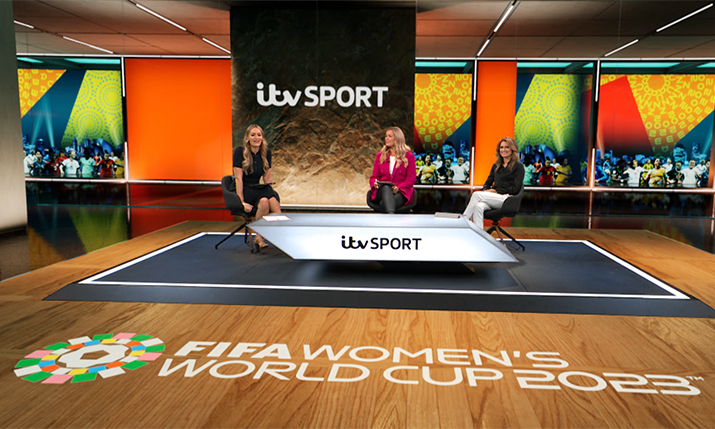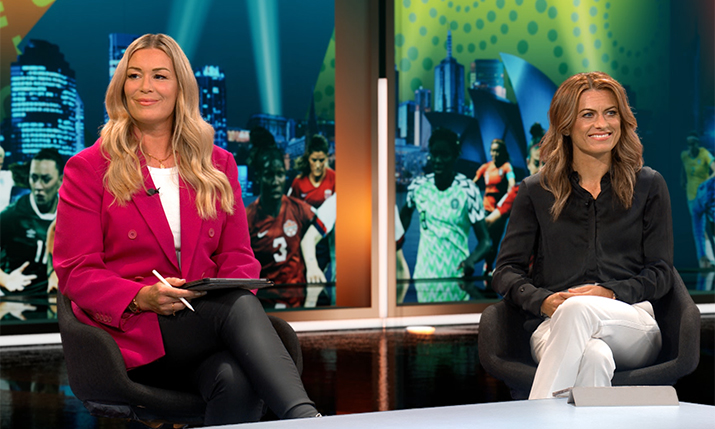2023 FIFA Women’s World Cup: ITV Sport goes remote and makes use of new virtual studio hub

ITV Sport’s coverage of the FIFA Women’s World Cup 2023 is centred around its new virtual presentation studio in Ealing, West London, with any unilateral coverage of the matches in Australia and New Zealand being produced remotely.
All 64 games from the tournament, which started in Auckland on 20 July, are being broadcast in the UK on either ITV or the BBC, except for the Final, which will be shown across both.
Importantly, ITV1 and ITVX will show two of England’s group stage games – their first match against Haiti and their final group fixture versus China. On the opening day of the tournament, ITV1 showed coverage of the Republic of Ireland taking on co-hosts Australia.
The virtual studio hub, first used on Six Nations Rugby coverage earlier this year, is the heart of the output, supplemented by a small reporting team down under.
ITV Sport’s Sarah Nurse, programme editor, and Rachael Jackson, senior producer, spoke to SVG Europe on the eve of the tournament, to outline how things will roll during Australia and New Zealand 2023.
“We are doing a remote production for the Women’s World Cup,” says Nurse. “We’re producing everything from Timeline’s Ealing Broadcast Centre (EBC) using our green screen studio. We have a full studio set up with VT and gallery and studio all in one place, and we are bringing in the world feed [from Host Broadcast Services] for all matches and a number of ISO sources which we select according to our editorial needs.
“Our AR studio is green screen and designed to offer us separate backdrops, including a seated studio position, promo corridor and balcony area. AR graphics can be applied to provide player profiles, head-to-heads, maps and more.”
“We have a presence in Australia too. We’ve got an England reporter [Katie Shanahan] and an England producer who will be generating content out there around the Lionesses. We will be doing some pitch side hits in the stadiums too, for England games and for the opening game, which is Australia versus the Republic of Ireland.”
Charismatic former England midfielder Jill Scott will be out there for ITV, providing not just analysis and insight but also an entertainment factor having won the ITV1 reality TV show I’m a Celebrity… Get Me Out of Here!
“She is a household name now,” adds Nurse. “Jill will work with Katie, our reporter. It’s really important to get that presence [in the stadiums].”
Read more 2023 FIFA Women’s World Cup: Inside the host broadcast operation
The video and audio of that unilateral coverage will be sent back to London using LiveU and for the World feed and ISO sources, ITV has partnered with the BBC, using IMG as a switching point.
All match feeds will be taken into ITV’s UK hub and edited for a daily highlights show on the ITV X platform.
Studio Presentation
For the pre and post-match, and half time, presentation and analysis, ITV’s green screen studio at the EBC will be ‘re-skinned’ virtually for the tournament, as Jackson, explains:
“Our AR studio is green screen and designed to offer us separate backdrops, including a seated studio position, promo corridor and balcony area. AR graphics can be applied to provide player profiles, head-to-heads, maps and more.
“Our studio graphics emulate the FIFA toolkit, which is very stylised and colourful, with indigenous and Māori inspired patterns. The AR screens in the studio are multifunctional and offer us the ability to place footage in the screens behind our studio presenters and pundits, so you get a great feel for what is happening within the stadiums, whilst keeping our studio team in vision. The AR studio gives us a lot of flexibility”
The virtual studio is built in Unreal Engine and controlled using Brainstorm. It is operated by MOOV and features a physical desk and multiple live VR screens. AR graphics elements can be added, also created by MOOV, with tracking done using Mo-Sys Star Tracker. The studio features three pedestal cameras and a jib, on which most of the AR graphics land.
ITV’s output will differ depending on the kickoff time in the UK. Pre-7am will be commentary only (with commentators calling the action ‘off tube’ from Ealing). Post-7am, things ramp up.
Nurse says: “We have the studio wraparound, from the virtual studio, with half an hour build-up for most matches and 45 minutes for England and for the opening game of the tournament. We will have a minimum of two guest [pundits] plus the presenter.”

Time difference
With the tournament being played on the other side of the planet to ITV’s viewing audience, the early kickoff times do have an impact – and it will affect the way the shows are produced, she adds. But it might end up being a positive.
“When you have a game in prime time, you have the capacity for a bigger audience. But England are not playing in the middle of the night. They have morning kick offs and the Lionesses are really popular with younger people and with children. In a way, it will work quite well for the kids, because they’ll wake up, and then they’ll be able to watch the matches. It’s the school holidays too [in the UK] so that’s a really positive thing.”
The time zone differences will necessitate a small change in working patterns at the EBC.
“Rather than everyone getting in at 2am, we’ll get the talent in at 5am and look to get stuff done the night before,” says Nurse. “So for me, personally, I need to get my head around the fact that I need the running order to be ready before I go to bed rather than doing that first thing in the morning.”
“We got [all the talent] confirmed, but much later than you would hope it would be. It wasn’t just us that were affected [by the rights delay]. It was happening in the whole of Europe as well. It has made the build-up more testing, let’s put it that way.”
Time zones have not been the only time-related issue to consider for this tournament. It took a long time for the broadcast rights allocation to be confirmed, which had an impact on ITV Sport’s prep.
“That’s really not been ideal,” says Nurse. “Obviously, we would have wanted this to have been resolved a lot sooner to allow more time to plan everything in greater detail.
“Particularly with the talent it was hard,” she continues, “because we weren’t able to confirm that we could actually use them. It’s been fine, and we’ve got everybody confirmed, but much later than you would hope it would be. It wasn’t just us that were affected. It was happening in the whole of Europe as well. It has made the build-up more testing, let’s put it that way. We have probably had to work double the hours in the day over the last month to get to where we are now.”
Led by presenters Laura Woods, Seema Jaswal and Michelle Owen, ITV’s Women’s World Cup ‘squad’ will also include expert insight, opinion and analysis from former and current players and managers including Eni Aluko, Karen Carney, Emma Hayes, Fran Kirby, Lucy Ward, Siobhan Chamberlain, Emma Byrne, Vicky Losada and Jen Beattie.
Commentary will come from Seb Hutchinson, Sam Matterface, Pien Meulensteen and Tom Gayle.

Crew and operators
While talent bookings were tricky due to the rights delays, there have been no issues when it comes to recruiting crew and operators.
“We started booking people before the rights deals were agreed. We had heavily pencilled in a lot of the people that we would work with normally and we’ve been lucky in the main that most people were happy to wait on that heavy pencil for us.”
Jackson adds: “Our relationships go back a very long way with these freelancers. We book them routinely because they’re really creative, they’re great to work with and we know what they can do. We’ve got such good working relationships that they know we won’t let them down. This loyalty and respect is something that you need for these kinds of situations because everybody knows sporting contracts are unreliable sometimes, and they come and go with the wind.”
The beautiful game
Women’s football has grown exponentially since the last FIFA World Cup in France in 2019. To the extent that TV coverage is now considered no different from the men’s game – both in terms of production values and editorial tone.
“I produce all the women’s football for ITV and our ethos is to cover it in exactly the same way that we cover the men’s,” says Nurse. “We don’t treat it differently. There are obviously different issues that come out of the different games. So we reflect those. But we will give it the same broadcast treatment.”
The raised profile of the women’s game has also brought with it other off-field considerations – from players being at loggerheads with their own federations regarding pay and prize money to the recent (and thus-far unexplained) rise in anterior cruciate ligament (ACL) knee injuries for female footballers. ITV won’t be afraid to cover those stories.
“It’s a growing sport,” asserts Nurse. “But the structure around it probably hasn’t quite caught up yet with the men’s game, although the men’s game does have its own issues of course. We need to strike a careful balance because we don’t want to ignore these issues because there have been some really big ones. But we also want to sell the tournament and enjoy the tournament for the festival of football that it’s going to be.
“Our ethos is to cover it in exactly the same way that we cover the men’s game. There are obviously different issues that come out of the different games. So we reflect those. But we will give it the same broadcast treatment.”
“So for the opening show, we ran a feature about ACL injuries, and we will talk about some of the other issues. We’re not going to shy away from the issues but it’s not going to be the main focus. We want to celebrate the great moments that are going to come from the tournament.”
While the 2023 FIFA Women’s World Cup will be a success for ITV if it produces great games of football, there is no denying that success for the home nation, in this case England, will amplify that significantly.
“If the football’s great, then England doing well will be the cherry on top,” concludes Jackson.
Will the ITV set-up change if the Lionesses progress deep into the tournament?
“I don’t see it changing because we don’t have the rights to either of the semi-finals. So I think it’s unlikely. It’s such a long way [to Australia] to do these kinds of last-minute type things – but you never know!”
The 2023 FIFA Women’s World Cup started on Thursday 20 July. England play their first game, live on ITV1 and ITVX in the UK, on Saturday 22 July.

